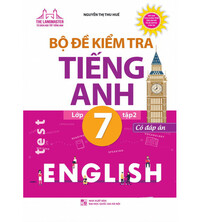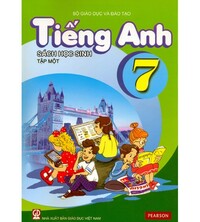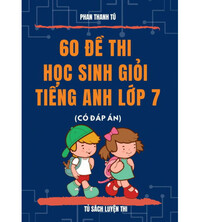Vocabulary & Grammar – trang 44 – Unit 12 – SBT tiếng Anh 7 mới
Look at the puzzle and find ten adjectives which can be used to describe an area. The words can go down, forward, or diagonally. Nhìn vào bảng chữ sau và tìm ra 10 tính từ sử dụng để mô tả một khu vực. Các từ có thể đọc từ trên xuống, từ dưới lên hoặc chéo.
Bài 1
Task 1. Look at the puzzle and find ten adjectives which can be used to describe an area. The words can go down, forward, or diagonally.
Nhìn vào bảng chữ sau và tìm ra 10 tính từ sử dụng để mô tả một khu vực. Các từ có thể đọc từ trên xuống, từ dưới lên hoặc chéo.

Key - Đáp án:
•SPACIOUS
•CROWDED
•PEACEFUL
•BUSY
•WEALTHY
• DIVERSE
• POOR . DANGEROUS
•POLLUTED
•NOISY
Bài 2
Task 2. Choose the direct effects from the box below for each cause. There can be two or three effects one cause.
Chọn hậu quả trực tiếp của mỗi nguyên nhân cho trong bảng. Một nguyên nhân có thể có 2 hoặc 3 hậu quả.
|
poverty |
loss of crops disease |
disease |
crime |
|
high death rate |
malnutrition |
homelessness |
little schooling |
|
Cause |
Effect |
|
1. Shortage of food |
|
|
2. floods |
|
|
3. no job |
|
|
4. poor healthcare |
|
|
5. child labour |
|
Key - Đáp án:
|
Cause |
Effect |
|
1. Shortage of food |
Malnutrition, crime |
|
2. floods |
Loss of crops, homelessness, disease |
|
3. no job |
Poverty, crime |
|
4. poor healthcare |
Disease, high death rate |
|
5. child labour |
Little schooling, high death rate |
Bài 3
Task 3. Choose a word/phrase in the box in 2 to complete the sentences. There can be more than one correct answer.
Chọn từ/cụm từ ở bài 2 để hoàn thành các câu sau. Có thể có hơn một đáp án đúng.
1. In Mongolia, over 30% of the population live in________.
Đáp án: In Mongolia, over 30% of the population live in poverty
Giải thích: poverty (đói nghèo)
Tạm dịch: Ở Mông Cổ, hơn 30% dân số sống trong nghèo khó.
2. A poor healthcare is the major cause of________.
Đáp án: A poor healthcare is the major cause of high death rate
Giải thích: high death rate (tí lệ tử vong cao)
Tạm dịch: Một nền y tế nghèo nàn là nguyên nhân chính của tỷ lệ tử vong cao.
3. Children who suffer from_____________ can have a lot of diseases.
Đáp án: Children who suffer from malnutrition can have a lot of diseases.
Giải thích: malnutruition (suy dinh dưỡng)
Tạm dịch: Trẻ con mà bị suy dinh dưỡng có thể có nhiều bệnh.
4. ____________ may happen when people do not have money or food.
Đáp án: Crime may happen when people do not have money or food.
Giải thích: Crime (tội phạm)
Tạm dịch: Tội phạm có thể xảy ra khi người ta không có tiền hoặc thức ăn.
5. __________ is quite popular in an overcrowded city. You can see people sleeping in a park or under a bridge.
Đáp án: Homelessness is quite popular in an overcrowded city. You can see people sleeping in a park or under a bridge.
Giải thích: Homelessness (vô gia cư)
Tạm dịch: Không nhà ở hoàn toàn phổ biến ở một thành phố dông đúc. Bạn có thể thấy người ta ngủ trong một công viên hoặc dưới gầm cầu.
6. ______ is one result of poverty. Poor children have to stop their studies to help in the house.
Đáp án:Little schooling is one result of poverty. Poor children have to stop their studies to help in the house.
Giải thích: little schooling( Ít học)
Tạm dịch: Ít học là kết quả của nghèo khó. Trẻ em nghèo phải ngừng việc học để phụ giúp gia đình.
Bài 4
Task 4. Complete each pair of sentences with ONE of the words below.
Hoàn thành mỗi cặp câu sau với một từ dưới đây.
|
healthcare |
overcrowded |
peaceful |
crime |
|
1 |
a. ________is not a problem in the slums only, isn't it? b. Some people commit______________ when they have no money and no food.
|
|
2 |
a. I don't want to five in an_________area. There is not enough space for us to play. b. So many people are moving to cities, making them______________ . |
|
3 |
a. - What's'_____________ mum - It's a system to take care of people's health. b. Poor people die because they do not have good__________ |
|
4 |
a. We enjoy living in a_______ neighbourhood which is free of noise and crime. b. The photo is fantastic. The countryside looks so________. |
Key - Đáp án:
1. Crime;
Đáp án:
a. Crime is not a problem in the slums only, isn't it?
b. Some people commit Crime when they have no money and no food.
Tạm dịch:
a. Tội phạm không là một vấn đề trong những khu ổ chuột phải không?
b. Vài người phạm tội khi họ không có tiền và thức ăn.
2. overcrowded;
Đáp án:
a. I don't want to five in an overcrowded area. There is not enough space for us to play.
b. So many people are moving to cities, making them overcrowded
Tạm dịch:
a. Tôi không muốn sống trong một khu vực đông đúc. Không có đủ chỗ cho chúng ta để chơi.
b. Vậy nhiều người đang chuyển đến những thành phố, làm cho chúng quá đông đúc.
3. healthcare;
Đáp án:
. - What's healthcare mum - It's a system to take care of people's health.
b. Poor people die because they do not have good healthcare
Tạm dịch:
a. Chăm sóc sức khỏe là gì vậy mẹ? - Nó là một hệ thống chăm sóc sức khỏe cho con người.
b. Người nghèo chết bỏi vì họ không có sự chăm sóc sức khỏe tốt.
4. peaceful
Đáp án:
a. We enjoy living in a peaceful neighbourhood which is free of noise and crime.
b. The photo is fantastic. The countryside looks so peaceful
Tạm dịch:
a. Chúng tôi thích sống trong một khu phố yên bình, không có tiếng ồn và tội phạm.
b. Hình ảnh thật tuyệt. Miền quê trông quá thanh bình.
Bài 5
Task 5. What do you want the world around you to be like in the future? Complete the sentences below with your wishes, using 'more', 'less' and 'fewer'.
Bạn muốn thế giới xung quanh trong tương lai như thế nào? Hoàn thành các câu dưới đây sử dụng 'more', 'less' và 'fewer'.
Example:
There will be more places for children to play.
There will be no more slums.

Bài 6
Task 6. Change the following statements into tag questions.
Chuyển các câu dưới đây về câu hỏi đuôi.
Example:
Shanghai is the largest city in population.
-> Shanghai is the largest city in population, isn't it?
1. There will be a new cinema in our village.
__________________________________
Đáp án: There will be a new cinema in our village, won't there?
Giải thích: vế trước khẳng định nên vế sau phải phủ định, vế trước ta sử dụng will vế sau ta dùng phủ định của will
Tạm dịch: Sẽ có một rạp phim mới ở trong làng chúng ta phải không?
2. The city is working on a project to provide the slums with clean water
__________________________________
Đáp án: The city is working on a project to provide the slums with clean water, isn't it?
Giải thích: vế trước khẳng định nên vế sau phải phủ định, vế trước ta sử dụng is vế sau ta dùng phủ định của be tưởng ứng chủ ngữ
Tạm dịch:Thành phố này đang làm một dự án để cung cấp nước sạch cho những khu ổ chuột.
3. We have seen The Slumdog Millionaire.
__________________________________
Đáp án: We have seen The Slumdog Millionaire, haven't we?
Giải thích: vế trước khẳng định nên vế sau phải phủ định
Tạm dịch:Chúng ta đã xem phim Triệu phú khu ổ chuột rồi phải không?
4. Everybody can tell the difference between a city and a megacity.
__________________________________
Đáp án: Everybody can tell the difference between a city and a megacity, can't they?
Giải thích: vế trước khẳng định nên vế sau phải phủ định, vế trước ta sử dụng can thì vế sau sử dụng phủ định của can
Tạm dịch:Mọi người có thể nếu lên sự khác nhau giữa một thành phố và một siêu đô thị.
5. We don't really know the cause of this disease.
__________________________________
Đáp án: We don't really know the cause of this disease, do we?
Giải thích: vế trước phủ định nên vế sau phải khẳng định, vế trước dùng thì hiện tại đơn ==> vế sau ta sử dụng trợ động từ của thì hiện tại đơn
Tạm dịch:Chúng ta không thật sự biết nguyên nhân của bệnh này phải không?
Bài 7
Example:
The air is fresh and the sun is shining, (it - be - beautiful day)
-> It's a beautiful day, isn't it?
1. You are watching a street painter painting a beautiful picture of a boy embracing a dog. (painter - have - great talent)
2. You are reading an advertisement of a circus coming to town, we-will go-circus).
3. A street vendor is selling doughnuts and you feel like eating them. [doughnuts - smell - delicious).
4. You see a one-wheel bike for rent and you want to try it. (we - can try - it).
Key - Đáp án:
1. This painter has great talent, doesn't he?
2. We will go and see this circus, won't we?
3. The doughnuts smell delicious, don't they?
4. We can try this bike, can't we?
Search google: "từ khóa + timdapan.com" Ví dụ: " Vocabulary & Grammar – trang 44 – Unit 12 – SBT tiếng Anh 7 mới timdapan.com"







